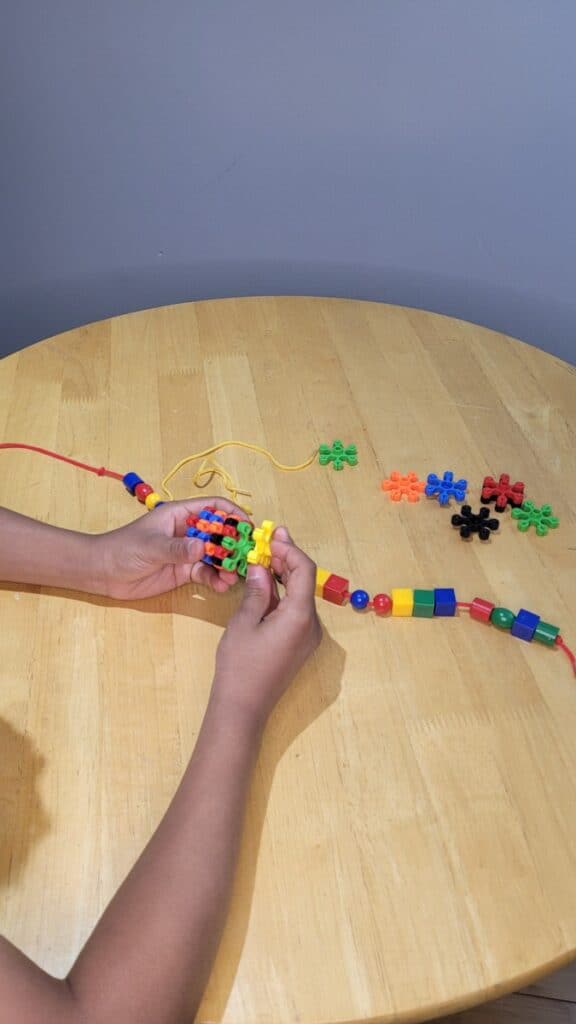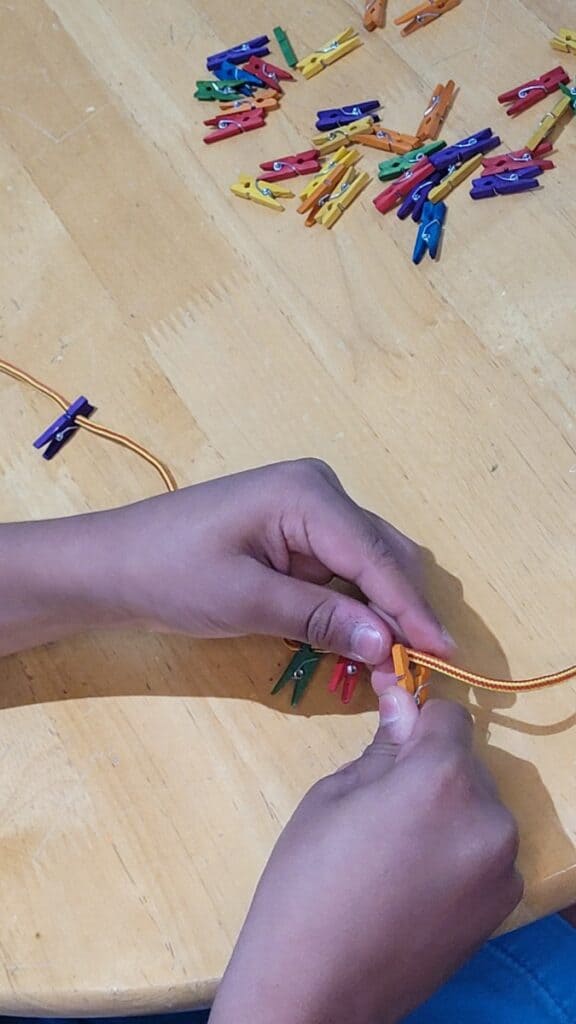Working as a school-based occupational therapist a big part of my job is to help students improve their fine motor skills.
Fine motor skills allow us to hold a pencil or button down a shirt. Fine motor skills are the ability to make movements of the hand that require dexterity and coordination to manipulate objects and perform tasks with precision.
How do Fine Motor Skills develop?
Fine motor skills develop during childhood as the child learns and grows. Muscles in the arms and hands continue to strengthen and hand movements become more refined.
Growing up, your child’s journey is a delightful adventure filled with blossoming skills. Those little arms and hands are on a mission to become stronger and more skilled, their movements becoming more graceful and precise. This incredible journey begins as your tiny newborn starts to wiggle and play.
As your child gradually masters the art of posture and control, a world of independence opens up. From their core to their fingertips, their whole body gets a boost, allowing them to explore and learn. That’s why giving them plenty of tummy time and chances to play is so crucial.
With each new achievement in postural control, your child gains more freedom to move their arms and hands in different ways. This newfound independence empowers them to explore their surroundings and dive into playtime with enthusiasm. And as their larger movements become more refined, so does their ability to control those intricate hand motions.
Imagine this: as their trunk and arms grow more stable, their wrists and hands join the dance, performing delicate tasks with finesse. Through the magic of play, those little hand muscles become experts at handling all sorts of shapes and objects, adapting to various positions and grips. And don’t forget, this is when they learn to adjust the pressure needed to hold or use an object effectively.
What happens when Fine Motor Skills are not developed?
When fine motor skills are not developed, children can have a difficult time fully exploring their environment and participating in school-related tasks.
When it comes to your child’s growth, achieving basic functions like reaching, grasping, carrying, and releasing is a significant milestone. These skills are like building blocks that pave the way for more intricate abilities. Think of it as a pathway leading to sophisticated actions like using both hands together and manipulating objects within one hand.
Sometimes, if these foundational fine motor skills experience delays, it can hinder the development of those complex abilities. This might stem from a lack of exposure or difficulty in separating movement patterns. For example, your child might move their entire arm instead of just their hand and fingers while trying to write with a pencil. This particular kind of fine motor skill challenge is known as “inadequate isolation of movements.”
Does Occupational Therapy Help with Fine Motor Skills?
Absolutely! Occupational therapy is a wonderful resource for enhancing fine motor skills! Helping to improve fine motor skills is one of the many areas that occupational therapy practitioners work on.

Occupational therapy practitioners (OTPs), the experts in this field, are dedicated professionals who specialize in helping individuals build, refine, or regain the abilities required for their everyday tasks.
Fine motor skills involve the coordination and mastery of the small muscles in our hands and fingers. These skills are vital for essential activities like writing, fastening buttons, using utensils, and handling small objects.
Occupational therapy practitioners employ a range of effective techniques to nurture the development of fine motor skills. They design exercises and engaging activities that focus on enhancing hand and finger agility, strength, synchronization, and precision. Picture activities like manipulating small objects, using tools related to schoolwork, solving puzzles, practicing handwriting, and getting crafty.
What’s more, we can also introduce adaptive tools or assistive devices to aid in fine motor skill enhancement. We are well-versed in suggesting tools such as pencil grips, modified utensils, specialized keyboards, or splints to empower individuals in efficiently accomplishing their day-to-day tasks. So, if you’re considering ways to bolster these skills, know that occupational therapy is here to support you every step of the way.
Skills that Pediatric Occupational Therapy Practitioners Work On

Pediatric occupational therapy practitioners work on fine motor skills, the underlying skills that affect fine motor skill development, and school readiness when it comes to fine motor and visual motor skills. Here are some examples:
a) Grasping and Manipulation: OTPs can help children develop appropriate grasping patterns and refine their ability to hold and manipulate objects. This includes skills such as pincer grasp (using the thumb and index finger), tripod grasp (using the thumb, index, and middle fingers), and the ability to rotate or manipulate objects with precision.
b) Eye- Hand Coordination: OTPs can focus on improving the coordination between hand movements and visual input. This involves activities that require children to track, reach, and accurately interact with objects based on what they see.
c) Bilateral Coordination: OTPs can help children coordinate both sides of their body, promoting skills such as using both hands together to perform tasks, crossing the midline (reaching across the body’s midline with one hand to the opposite side), and bilateral hand manipulation (using one hand to stabilize an object while the other hand manipulates it).
d) Fine Motor Control: OTPs can work on developing precise control of the small muscles in the hands and fingers. This includes activities that require precise movements such as buttoning clothes, tying shoelaces, using scissors, manipulating small objects, and performing activities that involve finger isolation and dexterity.
e) Hand Strength and Endurance: OTPs can help children develop the strength and endurance needed for sustained fine motor tasks. This can involve activities that target finger and hand strength such as squeezing, pinching, and manipulating resistive materials, or engaging in activities that require sustained effort such as coloring or writing.
f) Pre-Writing and Handwriting Skills: OTPs can assist children in developing age-appropriate pre-writing and handwriting skills. They may work on pre-writing skills such as tracing and drawing lines, shapes, and patterns to build foundational skills for handwriting. They also work on pencil control, letter formation, letter size, line regard, spacing, and overall legibility.
g) Self-Care Skills: OTPs can address fine motor skills related to self-care activities such as buttoning, zipping, managing fasteners, tying shoelaces, using utensils, opening containers, and grooming tasks like toothbrushing.
These examples offer just a glimpse into the diverse array of skills that pediatric occupational therapy practitioners can address. Every therapy session is tailored to cater to the unique needs and objectives of each child. The therapist employs a variety of engaging activities, exercises, and strategies to foster skill enhancement and boost independence in daily routines.
If your child or student is facing challenges with their fine motor skills, don’t hesitate to connect with an Occupational Therapy Practitioner in your vicinity. Remember, expert guidance can make a world of difference! They can provide you with further insights and information about how to best support your child’s development.
“Always remember, empowering our children goes a long way in helping them become independent and build their self-esteem.”
